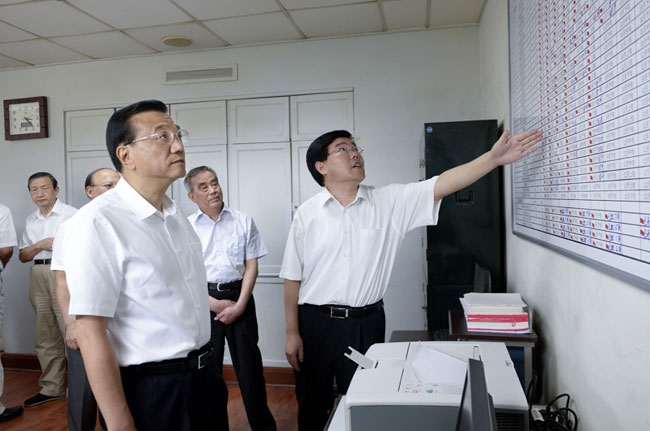Premier Li courts private investment in railways
 0 Comment(s)
0 Comment(s) Print
Print E-mail Xinhua, August 24, 2014
E-mail Xinhua, August 24, 2014
|
|
|
Chinese Premier Li Keqiang (front) looks at a chart during an inspection tour to the China Railway Corporation in Beijing, China on Friday, August 22, 2014. Li Keqiang has encouraged the China Railway Corporation (CRC) to further emancipate the mind and seek more social capital. [Xinhua] |
Chinese Premier Li Keqiang wants to see more private investors involved in railways, the central government's website reported on Sunday.
Railways stabilize economic growth, enhance social harmony and will help urbanization, said Li during an inspection of the China Railway Corporation (CRC) on Friday. 0 "But railways paid for solely by the government and managed by administrative order must become a thing of the past," said the premier, encouraging the CRC to seek innovative sources of new investment, key to railway reform.
China has spent vast sums on railways in recent years. Changing the way they are financed is very high on the government's to-do list.
The State Council came up with an action plan on railway financing in April, deciding to set up a fund open to private investment. The fund value is expected to reach 300 billion yuan (48.6 billion U.S. dollars). In addition, 150 billion yuan of railway bonds will be issued this year, with overtures being made to banks to encourage them to fund railway projects. Central and western regions will be the top priority.
Shortly after the State Council meeting, the CRC raised the bar on railway investment for 2014 to 800 billion yuan, hoping to bring over 6,600 kilometers of new track online.
"People in these (central and western) areas are eagerly looking forward to new railways, which will narrow the gap between the west and the east and bring them into the center of our nation's modernization process," said Li.
According to HSBC chief China economist Qu Hongbin, China's rail freight accounts for a quarter of the world's total and passenger traffic is even busier, but, in terms of actual track, China has only six percent of the world's lines.
"Relatively weak railway capacity resulted in too much road traffic, which greatly increased logistical and environmental costs," said Qu.
A disastrous bullet train crash in July 2011 brought an atmosphere of unprecedented caution to rail construction in China. Since then, it has become clear that the speedy development of the sector will fuel economic expansion, while benefiting the people by making it quicker and easier to get about.
Railways are fundamental to China's development and their purpose cannot be achieved in any other feasible way, said Li.
"We should turn the great potential of railways into real productivity and make the sector a new engine of change," said the premier.







Go to Forum >>0 Comment(s)